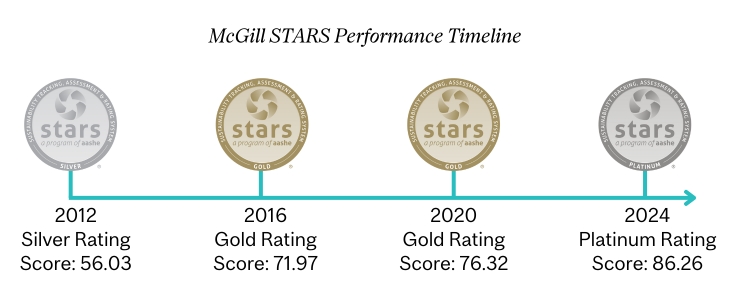In March 2024, McGill earned a Platinum rating under the Sustainability Tracking, Assessment & Rating System (STARS®). At the time of submission, only 14 institutions worldwide and five in Canada held the STARS program’s highest sustainability rating. This achievement fulfills a commitment made by the University in 2017 to achieve a Platinum rating by 2030, six years in advance.
Over 1,200 institutions globally have enrolled in the STARS® program, making it the leading benchmarking framework for measuring sustainability performance in higher education. It ensures impartial assessment and credibility across Academics, Engagement, Operations, and Planning & Administration categories, with bonus points for Innovation & Leadership.
McGill’s STARS® Journey
McGill submitted its first STARS report in 2012, earning a Silver rating. This was followed by a Gold rating in 2016, which was successfully renewed in 2020.

2024 STARS® Report
McGill Category Performance Benchmark

*Average scores from all US and Canadian institutions reporting under STARS v2.2.
**Average scores of the eight U15 institutions reporting under STARS v2.2.
For more insights, explore the ![]() STARS Report Summary 2024 (PDF) to see McGill's areas of success and opportunities for improvement.
STARS Report Summary 2024 (PDF) to see McGill's areas of success and opportunities for improvement.
Securing the Platinum STARS® signifies the University’s commitment to sustainability excellence and paves the way for our future projects. Maintaining our Platinum sustainability rating means that McGill must continue to embed sustainability in all areas and at every level. As such, the University aims to achieve a STARS® score of 85+ for its subsequent submissions.
Get involved in maintaining our Platinum sustainability rating
-
Take the online sustainability module
-
Learn how to properly sort your waste on campus
-
Embed sustainability into your degree with sustainability-related courses and programs
-
Engage with the broader Montreal community through community service and volunteering
-
Enjoy plant-based and sustainably sourced food options at McGill’s dining halls and on-campus food locations
-
Get your lab, workplace, or event certified with the sustainability certification programs
-
Apply to the Sustainability Projects Fund
Frequently Asked Questions
Why does McGill use the Sustainability Tracking, Assessment & Rating System (STARS®)?
Like hundreds of our peers, McGill utilizes the Sustainability Tracking, Assessment, and Rating System (STARS®) to evaluate its sustainability efforts. Validated by an independent panel of sustainability experts, the framework is among the most widely recognized benchmarking framework for sustainability performance in higher education as it ensures impartial assessment and credibility in evaluating sustainability practices.
The framework is built around four categories: Academics, Engagement, Operations, and Planning & Administration, with bonus points available in the area of Innovation & Leadership.
There are five levels of recognition for STARS®:
- Reporter
- Bronze: minimum score of 25
- Silver: minimum score of 45
- Gold: minimum score of 65
- Platinum: minimum score of 85
What are the advantages of this rating system?
The STARS® program is not just about checking boxes to obtain points. It was designed to evolve over time to reflect the latest challenges in campus sustainability. The revision process takes place every three to five years and involves members of the campus sustainability community.
Over 1,200 universities across North America and beyond have registered in the STARS® program, making it easier to develop and share best practices among institutions. STARS® can also be used to inform university policy and procedures, creating lasting, sustainable change over time.
What does achieving Platinum mean?
Achieving Platinum means obtaining 85 percent, or more, of available points in the STARS® framework. In 2024, McGill earned 86.26% of available points by embedding sustainability in its academic, operational, and governance units, as well as effectively engaging students, staff, and faculty in sustainability initiatives across the campuses.
How did we achieve Platinum?
Achieving our Platinum rating was a collaborative effort by all members of the McGill community, including students, staff, and faculty. The University improved in two major areas over the past 4 years:
- Sustainability in Learning
- Adopted a sustainability learning outcome
- Implemented a sustainability literacy assessment
- Sustainable Buildings
- Sustainable building design standards and certifications
- Tracking and diverting construction waste
- Reduced energy consumption
How does STARS® change over time?
The STARS® framework continues to evolve over time to recognize the different contexts in which institutions operate, while maintaining a level of standardization so that universities’ sustainability efforts can be meaningfully compared. As institutions improve and score higher ratings, the framework is also modified according to best practices so that institutions can continue to grow their efforts to meet new sustainability challenges. Since 2010, there have been seven versions.
What were the challenges in achieving Platinum?
The constant evolution of the STARS® program is essential and challenging. Cultures at large institutions tend to evolve slowly, and sustainability policies and processes can take a long time to implement. By contrast, AASHE updates the STARS® framework approximately every three years. As such, McGill has been striving to continually implement best practices that have improved its score.
Other considerations include the silo effect in universities, which makes cross-unit collaborations challenging, and the coordination of communications with over 30 data-providing units and over 50 individual contributors.
Our Platinum rating is a testament to the McGill community’s commitment to sustainability excellence across the University’s campuses.
Looking forward
Achieving a Platinum STARS® rating does not mean that the University’s sustainability efforts are over. The updated indicators in STARS® 3.0, released in 2024, have informed the planning and implementation of the Climate & Sustainability Strategy 2025-2030.

